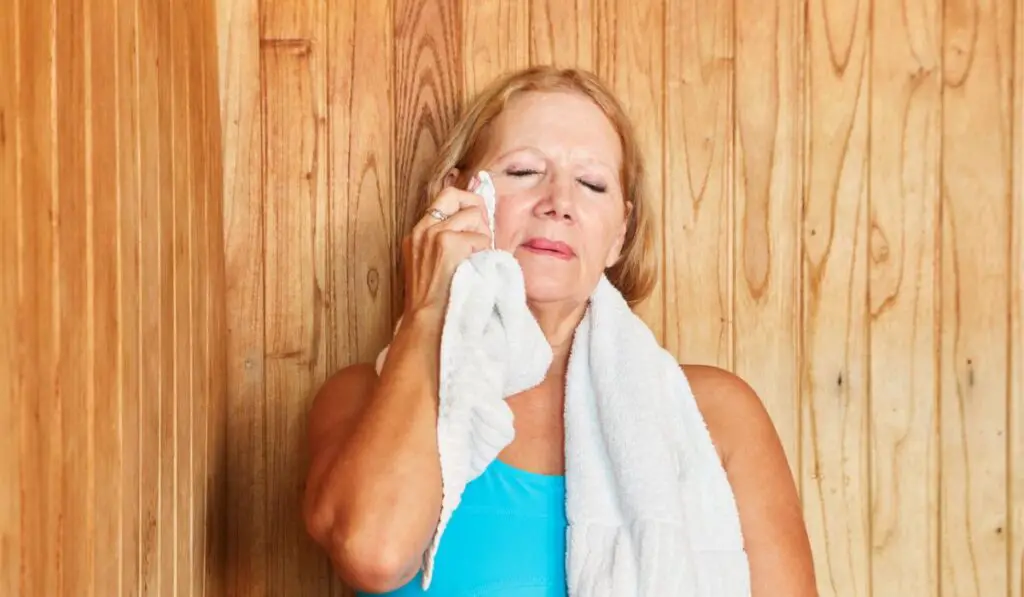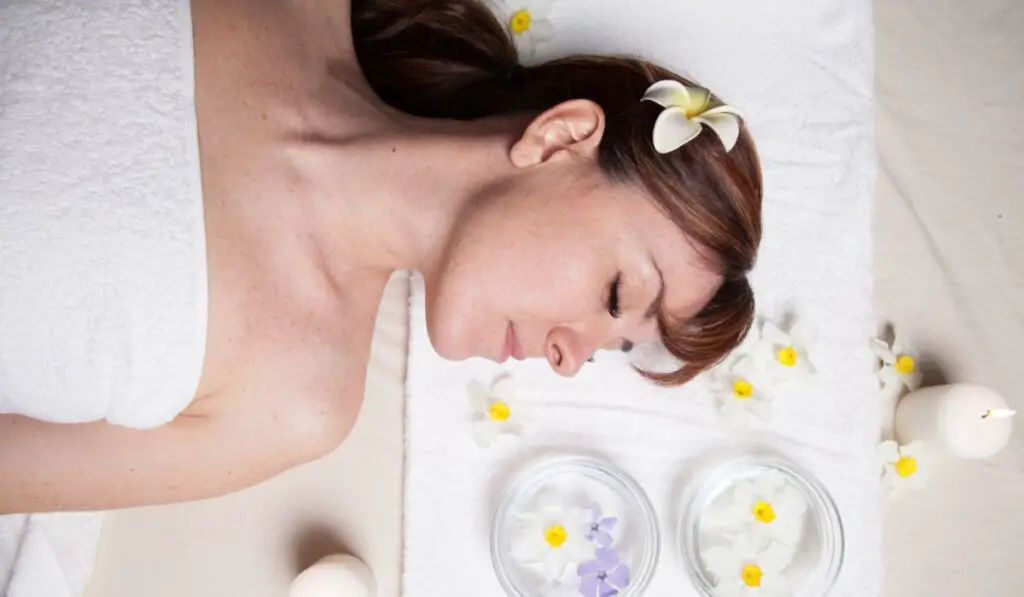Saunas are relaxing, and it’s common to feel tired after using a sauna. There’s a lot going on inside your body to explain your fatigue. There can also be negative effects of the sauna that are making you tired. This short guide tells you everything you need to know about what’s making you sleepy as well as how to re-energize afterward, so what’s the main reason then?
Sauna use can make you feel tired because your body works very hard to maintain homeostasis in a hot environment. Your body is attempting to regulate its temperature by sweating. This can dehydrate you causing you to be tired after a long sauna session.
You may be relaxing while in the sauna, but your body is doing a lot of work. You feel tired after sauna use because deep within you, your whole body is active while you’re kicking back enjoying the heat of your sauna.
Why You Feel Tired After Sauna Use

The heat that you find so pleasant and relaxing is at the heart of what’s making you tired. The high temperature in the sauna causes your heart rate to increase and blood vessels to dilate. It also causes your blood pressure to drop.
While this is a natural and normal response to the heat of the sauna and can be beneficial to your health in many ways, it means your body is working harder and in a way that’s different than it’s used to. This makes you feel tired.
In part because of the increased circulation, sauna use is healing. It’s been shown to relieve chronic pain and repair damaged muscles and other tissue. To heal, though, the body is working hard. Also, it needs you to reduce your activity and sleep so it can work on the healing process. You feel tired because your body needs you to slow down and chill.
There’s another very normal bodily function that is affected by sauna use, and you feel tired because of it. A process called thermoregulation keeps your body’s temperature balanced and in the normal range. Two aspects of the sauna impact thermoregulation and fatigue.
Thermoregulation Requires Effort
When your central nervous system senses a rise in temperature, like when you’re sitting in the intense heat of the sauna, it tells a part of your brain called the hypothalamus to respond and deal with it.
The hypothalamus, in turn, signals your whole system to react. The nervous system, muscles, organs, and glands all kick in. The blood vessels react, too, by opening in a process called vasodilation to accommodate the increased blood flow and sweating.
When you step out of the sauna, your body has to switch gears. Cooling off doesn’t just happen spontaneously. Your body has to work to do it. Vasoconstriction returns blood vessels to their normal diameter, and a process called thermogenesis causes your muscles and organs to produce heat.
In other words, your glands release hormones to increase metabolism and burn energy for heat. Thermoregulation is a great deal of work and is exhausting for the body; this is one big reason why saunas take a lot of energy out of you.
Thermoregulation Also Impacts Your Circadian Rhythm
Circadian rhythm is a set of internal processes that are involved in your natural sleep-wake cycle. Temperature is one of them. During the day, your body temperature naturally rises, and as night falls, it begins to lower (and continues to do so through the night) so you can sleep.
The intense heat of the sauna followed by a steady drop in body temperature afterward mimics this natural rhythm. As your temperature cools, your body thinks it’s time for sleep. No wonder you feel tired after the sauna! Your body is doing a great deal of work for you. Additionally, other factors related to sauna use can also deplete you and make you tired. Check out the section below to learn more.
Other Effects of Sauna Use That Can Deplete You

Factors other than normal body response to the heat of the sauna can make you feel tired and even ill.
- Dehydration. Saunas make you sweat, and excessive sweating can lead to rapid dehydration. This dangerous condition can make you feel exhausted and lethargic.
- Underlying medical conditions. Sauna use can worsen certain medical conditions, including (but not limited to) diabetes and heart disease. Fatigue is a sign that something may be wrong. If you have any type of health condition, it’s important to check with your doctor before using a sauna.
- Medication interference. Your heart rate and circulation increase because of the high temperatures in the sauna. This can interfere in the way certain medications are distributed throughout your body and/or metabolized in your system, making you tired and affecting your health and safety. Corticosteroids and nicotine patches are known to be negatively affected by sauna use, as are other medications. If you’re taking any type of medication, consult with your doctor or pharmacist to be sure that sauna use is safe.
- Circulating toxins. Sauna sweating allows your body to rid itself of toxins. If you have a high level of toxins in your body, not all will be able to escape through your pores as you perspire. Some will remain in your bloodstream, flowing briskly throughout your body thanks to your increased temperature.
- Improper sauna use. Disregarding sauna safety guidelines by maintaining a room temperature that is too hot or staying inside too long can be dangerous and make you feel fatigued. Never exceed a temperature of 170 degrees Fahrenheit (76 degrees Celsius) for a traditional sauna or 130 degrees (54 degrees) for an infrared sauna. Also, never exceed 20 minutes in a traditional sauna or 30 minutes in an infrared sauna.
- Time of use. If you’re using your sauna at the end of a long day or after a workout, your body will already be exhausted. Sauna use can make you feel even more tired.
How to Reset After a Sauna Session
While it’s nice to step out of the sauna feeling relaxed, you might not be ready for sleep and don’t want to feel sluggish and exhausted. Thankfully, you don’t have to resign yourself to fatigue for the rest of the day. Try these things to energize and reset after a sauna session, additionally, make sure you always keep your sauna clean with our guide as a reference.

- Drink plenty of water. Drinking water before, during, and after sauna use can prevent dehydration and the exhaustion that comes with it. Aim for about six cups of water across your sauna experience to feel refreshed and energized.
- Move your body. Unless you’re just stepping into the sauna briefly to loosen muscles before a workout, you shouldn’t exercise heavily afterward. You can, though, take a walk or engage in other light activities to wake up your body.
- Eat a light, healthy snack. Feeding your body a small amount of nutritious food after your sauna session can fuel you up. Foods that are known to boost energy and fight fatigue include whole grains like rice, oats, or quinoa, nuts, protein like eggs or beans, and certain fruits and vegetables like apples, avocados, bananas, berries, beets, and greens.
- Have a cup of coffee or tea (but with a caveat): While coffee and tea are considered to be healthy caffeinated beverages that can provide you with a burst of energy, use them sparingly after the sauna. Caffeine is dehydrating, so it can make you feel more groggy. Drink water first. Also, the quick energy boost doesn’t last long, and when the caffeine wears off, you’ll feel tired again because you haven’t actually tended to your body’s needs.
A Radical Solution: Sleep!
Remember why you’re tired after your sauna session. Your body has been working hard, it’s engaging in the healing process, and thermoregulation is telling it that it’s time for bed. Consider using the sauna later in the day, allowing yourself at least an hour to an hour and a half to cool down (otherwise your higher temperature will keep you awake).
Then, you can continue to relax and unwind and give your body what it needs—a good night’s sleep. It’s natural to feel tired after sauna use. Ensure that negative effects aren’t at the root of your fatigue, and then rest assured that the sauna is helping your body be well.


